Do you know the detrimental effects of petting service dogs without permission?
While the temptation to engage with these devoted animals may be strong, it's vital to consider the impact of your actions.
A simple pat on the head may seem harmless, but the consequences can be more profound than you realize.
Understanding the reasons behind this rule can shed light on the significance of respecting service dogs' boundaries and responsibilities.
Key Takeaways
- Service dogs require focus for their important tasks.
- Interfering with service dogs can endanger their handlers.
- Service dogs are working animals, not pets.
- Respect service dogs by avoiding distractions and interactions.
Importance of Service Dogs
Service dogs play a vital role in ensuring the safety, independence, and mobility of their handlers. These highly trained animals aren't just pets; they're essential companions that help individuals with disabilities navigate their daily lives. Whether guiding the visually impaired, alerting the hearing-impaired to important sounds, or providing assistance with mobility tasks, service dogs are indispensable.
By remaining focused and attentive to their handler's needs, service dogs contribute significantly to their well-being and quality of life. Their specialized training allows them to perform specific tasks that enable their handlers to move freely, feel secure in public spaces, and accomplish daily activities that may be challenging without assistance.
Respecting the importance of service dogs is crucial in supporting individuals with disabilities in leading independent and fulfilling lives.
Distractions and Risks
Avoiding distractions around service dogs is crucial to ensure they can focus on their essential tasks effectively. Here are some important points to consider:
- Maintain Distance: Give service dogs space to work without interference.
- Avoid Temptations: Refrain from making noises or gestures that could distract the service dog.
- Respect Boundaries: Don't attempt to touch or interact with the service dog unless given explicit permission by the handler.
Service Dogs Vs. Pets
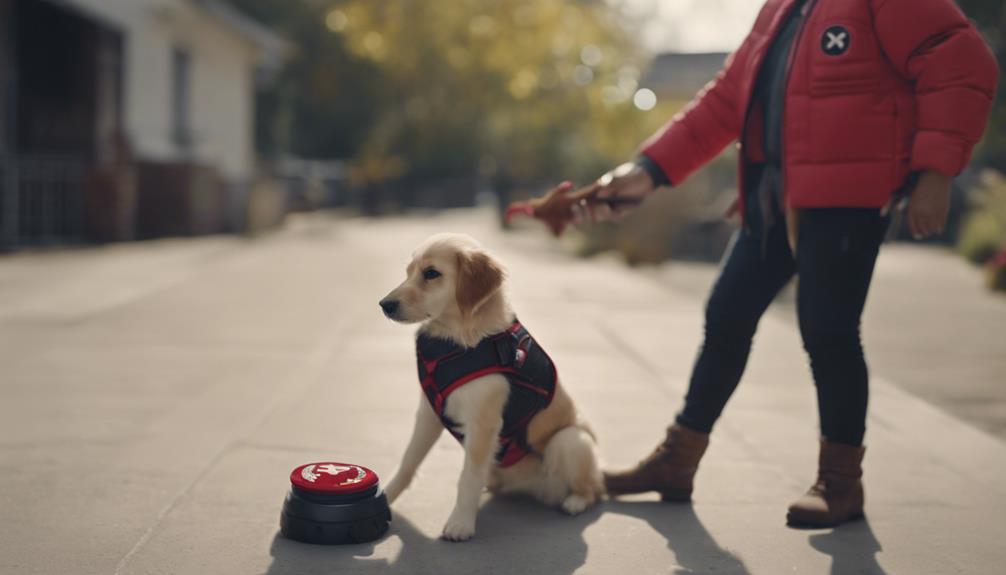
For some, it may be surprising to distinguish service dogs from pets, given their distinct roles and responsibilities. Service dogs are trained to perform specific tasks to assist individuals with disabilities, ensuring their safety, independence, or mobility. Unlike pets, service dogs are working animals rather than companions for leisure.
While pets provide emotional support and companionship, service dogs undergo rigorous training to fulfill essential functions for their handlers. It's crucial to understand that service dogs aren't meant to be approached or treated like regular pets due to their critical responsibilities. Recognizing this difference is vital in respecting the important roles that service dogs play in the lives of those they assist.
Respecting Service Dogs
When around service dogs, remember to give them the space they need to focus on their important tasks. Here are three key ways to show respect for service dogs:
- Avoid unnecessary interactions: Refrain from trying to distract or touch service dogs without permission.
- Respect their working status: Understand that service dogs aren't pets and should be treated as working animals.
- Support their focus: By giving service dogs the space to concentrate on assisting their owners, you contribute to their ability to perform their crucial tasks effectively.
Respecting service dogs is essential to ensuring they can fulfill their duties and support their handlers effectively.
Proper Interaction Etiquette
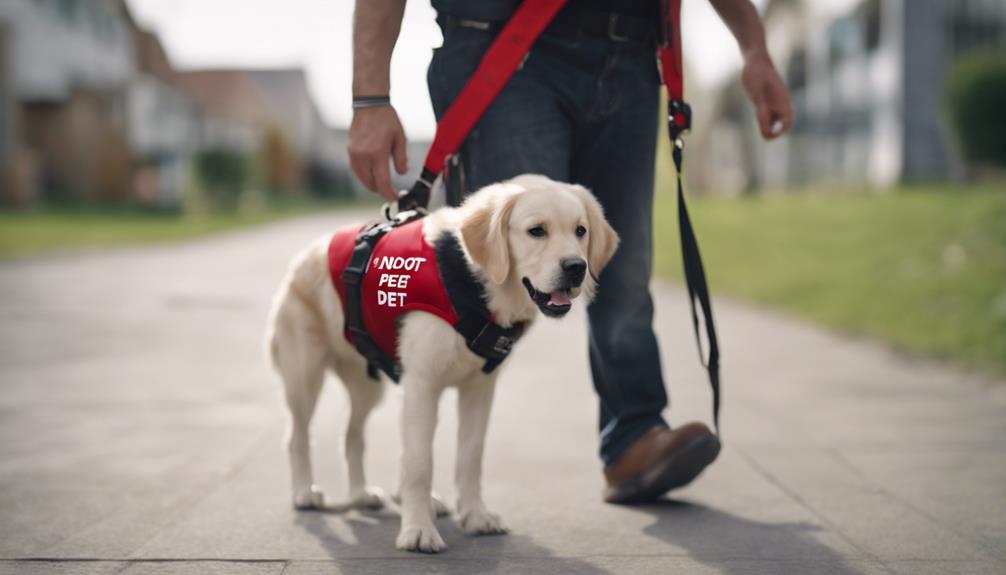
Ensure you respect the working status of service dogs by following proper interaction etiquette when in their presence. Give service dogs their space to focus on assisting their owner. Avoid trying to distract them with noise, gestures, or attempts to touch them.
Refrain from asking personal questions about the service dog and remember they're working animals, not pets. Interacting with a service dog can disrupt their important tasks, risking the health or well-being of their owner. Being polite and understanding the significance of their role is crucial.
Understanding Service Dog Identification
Respecting the working status of service dogs is crucial for proper interaction etiquette. Understanding how to identify them is essential.
Key Points for Identifying Service Dogs:
- Service dogs are protected under the Americans with Disabilities Act (ADA).
- Service dogs may wear vests or harnesses but aren't required to do so.
- The ADA defines service dogs as those trained to assist individuals with disabilities.
ADA Protection for Service Dogs
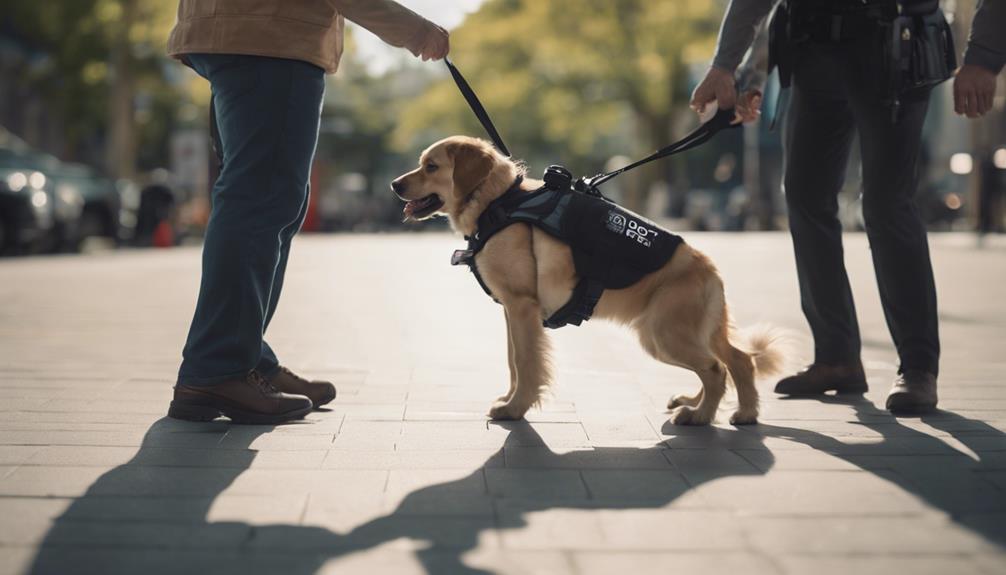
Understanding the ADA protection for service dogs is crucial for recognizing their rights and responsibilities in various settings. Service dogs are safeguarded under the Americans with Disabilities Act (ADA). This means that individuals with disabilities are allowed to have their service dogs accompany them in public places.
The ADA defines service dogs as specially trained animals that aid individuals with disabilities. These dogs aren't considered pets but rather working animals. While service dogs may wear vests or harnesses indicating their role, such identifiers aren't mandatory.
It's important to respect the ADA protection for service dogs by acknowledging their vital functions and refraining from treating them as pets in public spaces.
Service Dog Training Guidelines
Recognizing the importance of proper training for service dogs is key to ensuring their effectiveness in assisting individuals with disabilities. Here are some guidelines to consider:
- Consistent Training: Service dogs undergo extensive and consistent training to perform specific tasks that aid their handlers in daily activities.
- Task-Specific Training: Service dogs are trained to carry out tasks tailored to the individual needs of their handlers, such as guiding individuals with visual impairments or alerting to medical conditions.
- Ongoing Evaluation: Regular evaluations ensure that service dogs maintain their training standards and are capable of providing reliable assistance to their handlers.
Service Dogs in Public Spaces
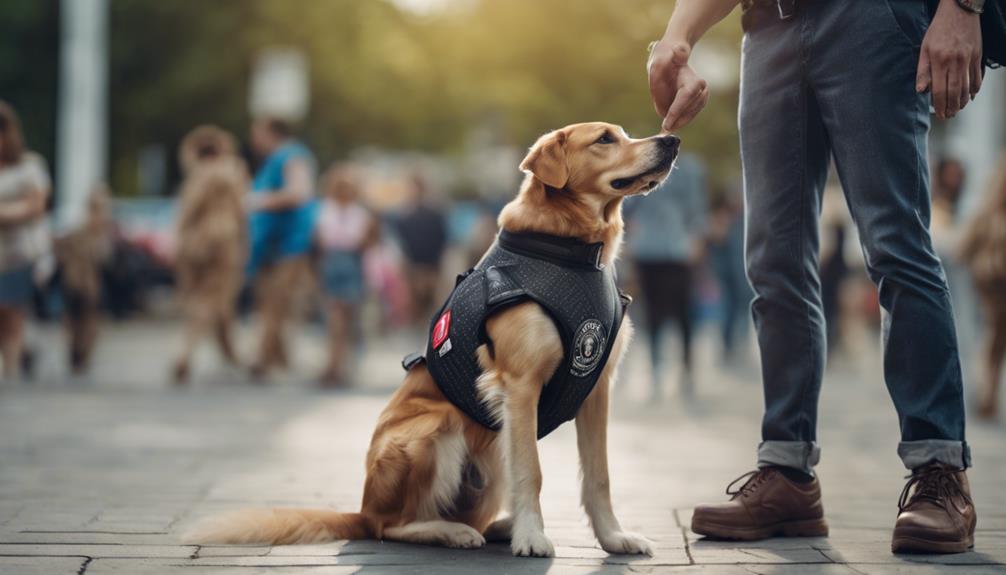
Service dog handlers must be aware of the regulations governing the presence of their service dogs in public spaces. When in public areas, service dogs are allowed to accompany their handlers to various locations, including restaurants, stores, and public transportation. These dogs are trained to assist individuals with disabilities, and their presence is protected under the Americans with Disabilities Act (ADA).
It's important for service dog handlers to ensure that their dogs behave appropriately in public spaces, remaining focused on their tasks and not causing disruptions. By following the guidelines set forth for service dogs in public areas, handlers can ensure that their dogs are able to perform their duties effectively and safely assist them in their daily activities.
Interacting With Service Dogs Safely
When in public spaces with your service dog, it's essential to know how to interact with them safely to ensure their focus on assisting you.
Interacting With Service Dogs Safely:
- Give them space: Allow service dogs to focus on their tasks without distractions.
- Avoid interaction: Refrain from trying to engage or distract service dogs unnecessarily.
- Follow instructions: If the owner permits interaction, adhere to their guidelines to ensure the dog's work isn't disrupted.
Service Dog Etiquette Tips
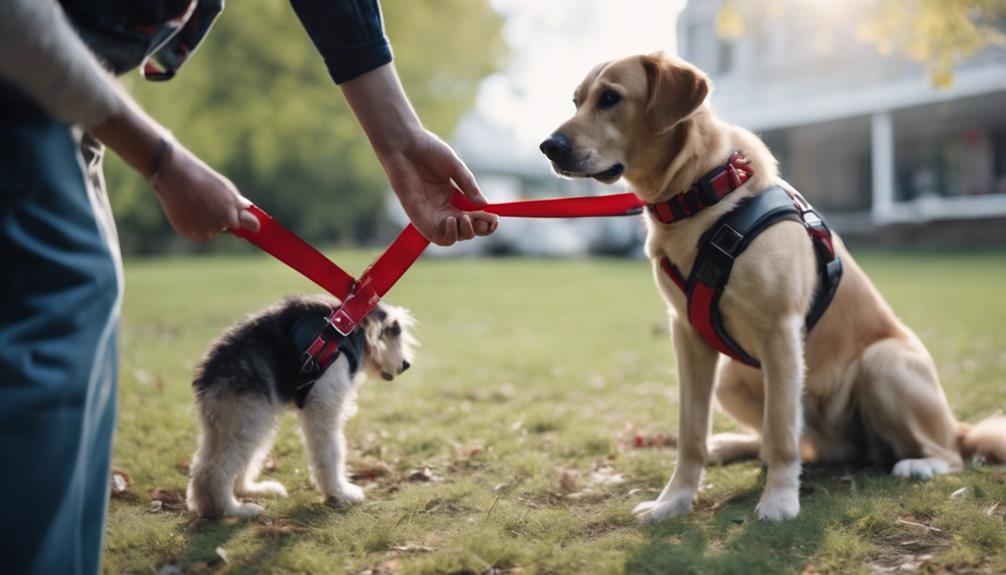
To ensure the well-being and focus of service dogs, always adhere to proper etiquette guidelines when in their presence.
Give service dogs space to assist their handlers without distractions. Avoid making noises, gestures, or attempting to touch them as it can interfere with their tasks.
Refrain from asking personal questions about the service dog and remember they're working animals, not pets. Respect that service dogs have important jobs and should be treated as such.
Understand that interacting with them could disrupt their crucial tasks. By following these etiquette tips, you can help create a safe and focused environment for service dogs and their handlers.
Service Dog Handler Requests
Adhering to service dog etiquette guidelines includes respecting and responding to service dog handler requests. When interacting with a service dog and its handler, showing consideration for their needs is essential. Here's what you should do:
- Follow the Handler's Instructions: Always listen to the handler's requests regarding their service dog. If they ask you not to interact with the dog, honor their wishes.
- Provide Assistance When Needed: If the handler requires help with their service dog, offer assistance but wait for them to instruct you on how to do so properly.
- Respect Boundaries: Understand that service dogs have specific tasks to perform, and respecting their space and focus is crucial for their handler's well-being.
Service Dog Responsibilities
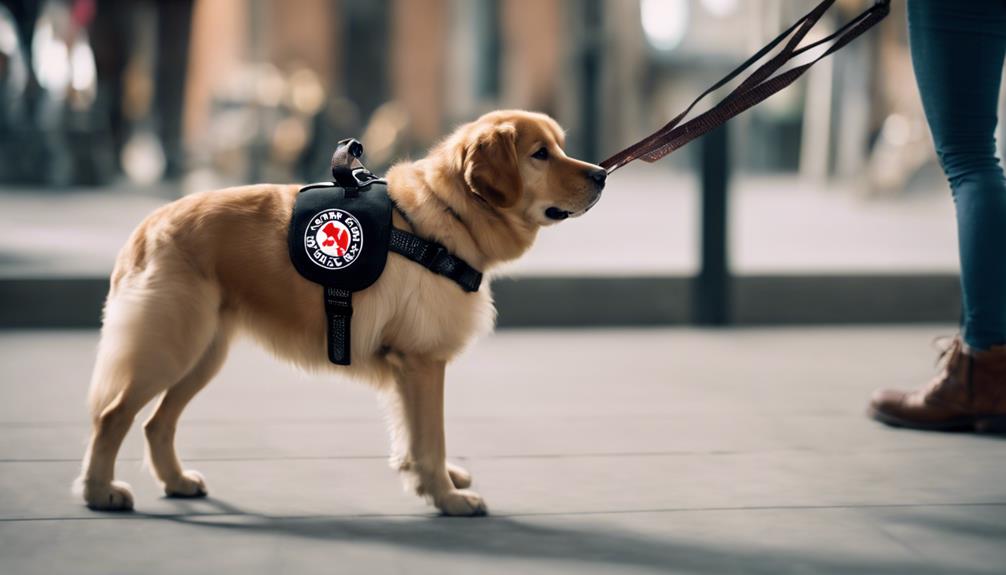
Respecting service dog responsibilities is crucial for supporting their handlers' needs and ensuring their well-being. Service dogs are trained to perform specific tasks to assist individuals with disabilities, such as guiding the visually impaired, alerting to seizures, or providing mobility support.
It's essential to acknowledge that service dogs have a job to do and shouldn't be treated as pets. By allowing service dogs to focus on their duties without distractions, you help their handlers navigate the world more independently and safely.
Understanding and respecting the responsibilities of service dogs contribute to creating a supportive environment for individuals who rely on their assistance in their daily lives.
Conclusion
Remember, service dogs play a crucial role in the lives of their owners by providing essential support and assistance.
It's not okay to pet these working animals as it can distract them from their duties and potentially put their handlers at risk.
By respecting service dogs and understanding their importance, we can ensure they can perform their tasks effectively and help their handlers navigate the world with confidence and independence.
Support service dogs by giving them the space and focus they need to do their job well.




